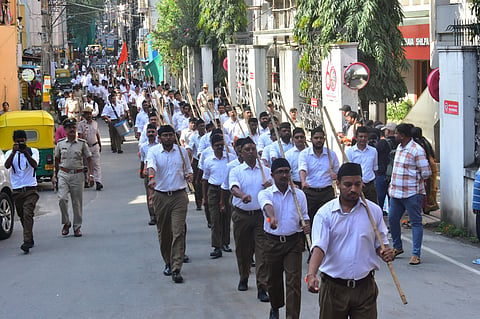

Follow TNM's WhatsApp channel for news updates and story links.
On October 12, thousands of men dressed in khaki and holding lathi sticks took to the streets of Bengaluru. One hundred marches were held across the city, with each reportedly seeing a turnout of 200-500 men. The large, lathi-wielding turnout marked the centenary year of an organisation that is not even formally registered, that is, the Rashtriya Swayamsevak Sangh (RSS).
Through October, the RSS had been holding route marches across Karnataka as part of its centenary celebrations. One RSS leader in Bengaluru told TNM that the goal was to hold a route march in every taluk across the country. The Hindutva outfit’s first such route march was held in 1926 in Nagpur, a year after its inception, and it has continued to hold such marches wherever it has had a presence.
The route marches have faced objections from Dalit and progressive groups in northern Karnataka. One group has dared the RSS to hold its route march with the national flag and prove its “self-declared patriotism” while another group has sought permission to hold a route march with the lathi and the Constitution.
The route marches have also reached court, after controversy erupted over the RSS using government facilities for the marches. Notably, two of the marches held in Bengaluru on October 12 had their starting points at state-run schools. Roughly a week before that, on October 4, Karnataka’s Minister for IT, BT and Rural Development, Priyank Kharge, had written to Chief Minister Siddaramaiah seeking a ban on the RSS using government facilities.
Even as this controversy rages, civil society groups in the northern districts like Kalaburagi and Yadgir have launched a campaign against the RSS, challenging it on certain fundamental aspects—being an unregistered organisation, its use of the lathi, and its claims of patriotism. However, amid the din of the controversy, the questions these groups are raising have largely been ignored by the media and the political establish